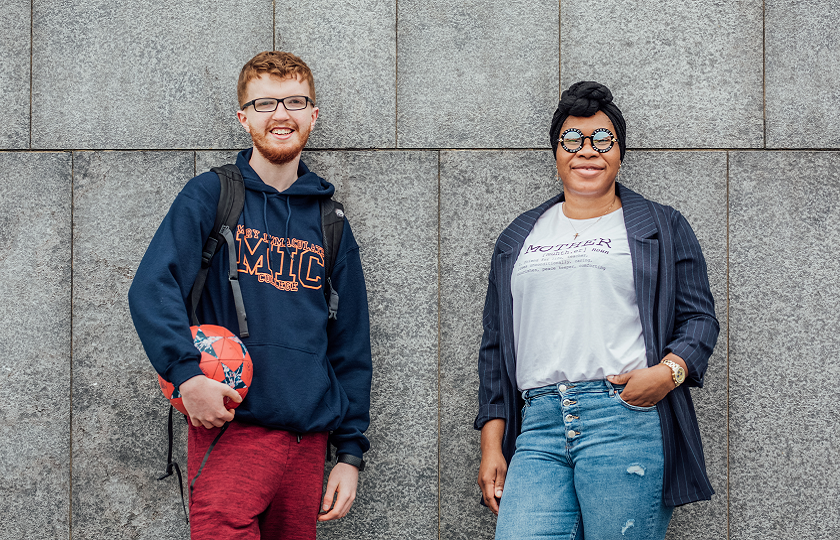
Considering your CAO options? Then consider Mary Immaculate College (MIC) and be part of a college which boasts a student retention rate of 95% (HEA Report 2019). This is one of the highest student retention rates in the country and means only 5% of students exit their programme of study before graduating.
The MIC CAO Hub showcases the unique student experience on offer at MIC and points to the supportive learning environment, real world skill development and the opportunities given to learners to reach their full potential as key reasons why students excel and remain for the duration of their studies.
This class leading approach is applied across the breath of MIC’s undergraduate programmes including its career focused degrees in psychology, Liberal Arts, early childhood education, theatre studies and primary and post-primary teaching.
According to the Dean of MIC’s Faculty of Arts, Professor William Leahy: "There are many Arts degrees to choose from across the country but the ones at MIC are characterised by a ‘small is beautiful’ ethos in which great care is given to the experience of our students. We get to know our students personally and our students get to know us – and that makes all the difference. We offer a range of degrees in Psychology, Theatre Studies as well as Humanities, Languages and the Social Sciences through the MIC Bachelor of Arts four-year degree programme and equip our students with the knowledge and skills required in the real world. Come and join us in the Faculty of Arts at MIC and experience our close and supportive community."
The recently launched Bachelor of Science in Psychology (B SC in Psychology – MI003), for student in-take in September 2022, is an excellent example of the real world skill development integrated into MIC degrees. This unique four-year, full-time honours degree Level 8 programme not only provides students with a comprehensive undergraduate education in psychology but includes learning in the workplace. The programme content is wide and varied and will prepare graduates for a range of careers while giving them the necessary psychological knowledge to pursue postgraduate studies in psychology.
The Bachelor of Arts (MI002) programme, which has been running for over 25 years and offers students the chance to choose from 13 subjects, is one of the best degrees to develop skills for a range of careers and for life. The flexibility of studying an Arts degree at MIC means that students can study a combination of familiar arts subjects and try new ones in first year before deciding on the two subjects they would like to bring to degree level. MIC arts students develop excellent communication and thinking skills that enable them to engage with the world around them and enhance both their personal and professional capacities.
According to current MIC French Studies PhD student, Sarah Clancy ‘My experience of the MIC Bachelor of Arts was excellent and gave me the chance to study a wide range of topics across languages, literature, cultural history and translation. The opportunity to study abroad in third-year to further enhance my knowledge of the French language, and also French culture, and the generally variety on offer on the degree was the deciding factor for me in choosing the BA at MIC. My undergraduate student experience was made even more memorable by the genuine interest the lecturers, and all I met at MIC, showed in students’ needs and progress.’

Similarly, the innovative BA in Contemporary and Applied Theatre Studies (MI001) offers a mix of academic and practical learning with students having access to the state-of-the-art 500-seater Lime Tree Theatre situated on the MIC Limerick campus. It’s the first hybrid programme of its type in Ireland and gives students a rounded practical and theoretical education in drama and theatre, and specific skills in the performance, production, analysis and application of theatre.
MIC has long been recognised as a leader in early childhood and teacher education in Ireland. According to Professor Emer Ring, Dean of the Faculty of Education; ‘As one of the largest faculties of its kind in Ireland, the Faculty of Education at MIC is committed to placing students at the centre of all that we do - ensuring that our students’ experiences on both our Limerick and Thurles campuses are at the cutting edge of the latest developments in early childhood, primary and post-primary education.’
The Faculty’s lecturers are recognised nationally and internationally as being at the forefront of developments in education and are acknowledged widely for the excellence of their teaching and research. The Faculty also works closely with early learning and care settings and schools throughout the mid-west region and beyond who provide students with exceptional opportunities to work with children from birth to 18 plus years of age in pre-school and school contexts. In addition, the Faculty has developed a wide range of links with colleges internationally and facilitate students in availing of international experiences during their time at MIC.
Professor Ring adds; ‘For all of these reasons and more, studying in the MIC Faculty of Education is a unique and rich experience where all students are valued and supported to achieve their potential in a dynamic, energetic and vibrant environment.’
For more on MIC, including information on the range of scholarships available, a virtual tour of MIC’s campuses located in the heart of Limerick City and Thurles town, student supports and services go to www.mic.ie/CAO



